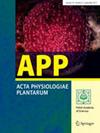The allelopathy of invasive plants on the growth performance of neighboring species is a crucial factor in their successful invasion. Drought can affect this interference. Numerous invasive plants, including Bidens pilosa L., can be distributed in different regions in China. This study aimed to analyze the allelopathy of the invasive Asteraceae plant B. pilosa (using its aqueous leaf extracts) from two distribution regions (a low-latitude region and a high-latitude region) in southern China on the seed germination and seedling growth of the Asteraceae plant Lactuca sativa L. under drought (simulated using Polyethylene glycol-6000). Bidens pilosa extracts from the low-latitude region induced greater allelopathy on L. sativa than those from the high-latitude region. Drought intensified the allelopathy of B. pilosa extracts on the seed germination and seedling growth of L. sativa. Bidens pilosa extracts from the low-latitude region posed greater allelopathy on L. sativa than those from the high-latitude region under light drought. However, B. pilosa extracts from the high-latitude region exhibited greater allelopathy on L. sativa than those from the low-latitude region under heavy drought. The intensified allelopathy of B. pilosa extracts on the seed germination and seedling growth of neighboring species under drought may be beneficial to its invasion process. Therefore, it is imperative to eradicate B. pilosa as expeditiously as possible in the habitats where seeds of neighboring species are sown to reduce the allelopathy of B. pilosa on the growth performance (particularly the seed germination and seedling growth) of neighboring species, especially under drought.


